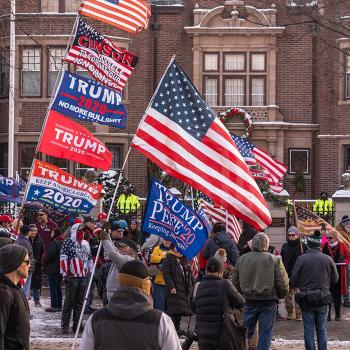The Supreme Court decided this week that the Westboro Baptist Church, led by the Rev. Fred Phelps, could spew hate-filled messages against the military and the United States during the funeral of a fallen soldier. The Westboro "theory" is that contemporary American wars are God's judgment on America for its failure to condemn homosexuals. This is speech that tests the toleration of the overwhelming majority of Americans. It is rabidly anti-homosexual, textbook paranoid, and holier-than-thou all at once.
This small clan stood on public property, carried picket signs with their signature message, and did not in fact disrupt the funeral, according to the Supreme Court.
You cannot blame the family of Marine Lance Corporal Matthew Snyder for wanting to sue the group for damages for its utter disrespect for his service and their private family time at his funeral. Apparently, the parents did not really notice the protesters (one can only assume that they were absorbed in the tragedy of their son's death) at the time. Just to be clear, the WBC posted online messages insulting the Snyders for not teaching their son what Jesus requires: the condemnation of homosexuals.
The Snyders did sue for intentional infliction of emotional distress, and the Church raised the First Amendment's Free Speech Clause in defense. The Church won.
On its surface, this may seem like a case in which the Court has failed to adequately respect a soldier who gave his life for America. That is what the lone dissenter, Justice Alito, believed. I don't see it that way.
Ironically, Lance Corporal Snyder lost his life defending the very rights vindicated in this case. We are in a struggle against fundamentalist Islamicism, which would suppress, if not execute, dissenters with views far from the mainstream (or even a small tributary). But the best of the First Amendment, as the Court notes, is its capacity to protect unpopular speech. One only has to glance at the headlines about the violent attempts to suppress political dissent in Libya to be reminded that this is a principle to be treasured.
This does not mean that every funeral protester is immune from tort liability. The decision left open the door to other litigants in the future. The Court emphasized that the protest did not disrupt the funeral; that would have been a stronger case for the Snyders. The Court also noted that another related issue will have to wait to be addressed in the future: Maryland enacted a law following the Snyder funeral that prohibits picketing outside funerals. As the Court noted, though, the constitutionality of such a law was not part of the Snyder case.
What with all of the coverage of the WBC, and its misguided leader Phelps, it is all too easy to tag the Supreme Court with inadequately honoring our servicemen and women. In fact, though, the Supreme Court decided two much less-publicized cases the day before Snyder v. Phelps came down, both of which were solidly in favor of our military.
In Henderson v. Shinseki, Henderson asked the Department of Veterans' Affairs for supplemental disability benefits. When he appealed, he missed the deadline set by the Veterans Judicial Review Act. The lower courts dismissed his claim, but the Supreme Court reversed, holding that the process was supposed to be non-adversarial and so the failure to meet the deadline was not fatal to his request.
In Staub v. Proctor Hospital, the Court took the side of a member of the United States Army Reserve who lost his hospital job due to anti-military animus. His supervisors viewed his military involvement as the source of scheduling difficulties, and eventually fired him. The Court held that the hospital was liable under the Uniformed Services Employment and Reemployment Act.
Any charge that the Court is in opposition to the military, therefore, is unfounded. The cure for the ugly talk coming from the Westboro Baptist Church is more speech, not less. Veterans groups and gay rights groups have all the rights the Church does to speak in opposition and to support our troops. So do the rest of us.
3/4/2011 5:00:00 AM





